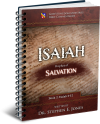Latest Posts
View the latest posts in an easy-to-read list format, with filtering options.

Isaiah is the prophet of Salvation. He is also known as the truly "Universalist" prophet, by which is meant that He makes it clear that salvation is extended equally to all nations and not just to Israel. He lived to see the fall of Israel and the deportation of the Israelites to Assyria, and he prophesied of their "return" to God (through repentance). He is truly a "major prophet" whose prophecies greatly influenced the Apostle Paul in the New Testament.
Category - Bible Commentaries

When Israel and Syria became allies in the invasion of Judah, the Judahites were terrified. This seems to be the incident which brought Isaiah out of his time of silence. His advice to King Ahaz was to place his faith in God, but instead, the king appealed to Assyria, preferring to lean on the arm of flesh.
Isaiah 7:3, 4 says,
3 Then the Lord said to Isaiah, “Go out now to meet Ahaz, you and your son Shear-jashub, at the end of the conduit of the upper pool, on the highway to the fuller’s field, 4 and say to him, ‘Take care and be calm, have no fear and do not be fainthearted because of these two stubs of smoldering firebrands, on the account of the fierce anger of Rezin and Aram and the son of Remaliah’.”
King Ahaz apparently was inspecting “the upper pool” in preparation for the coming siege, because this was part of the city’s water supply. The pool in question was the Gihon Spring in the Kidron Valley, flowing from a cave. Because of its intermittent flow, the Pool of Siloam was constructed to store the water when it flowed. Gihon means “rushing forth, breaking forth,” and in this case it speaks of water bursting forth from the ground (cave).
The presence of Isaiah's son, who had been named prophetically, “The remnant shall return,” underscored how the presence of the remnant was preventing utter disaster such as seen in the story of Sodom and Gomorrah (Isaiah 1:9). Isaiah’s message was both hopeful and respectful. Ahaz was not a godly king, but the prophet was not told to reprimand him in any way. Isaiah simply pointed the king toward the course of action that he ought to take.
Isaiah 7:5-7 continues,
5 “Because Aram, with Ephraim and the son of Remaliah, has planned evil against you, saying, 6 ‘Let us go up against Judah and terrorize it, and make for ourselves a breach in its walls and set up the son of Tabeel as king in the midst of it,’ 7 thus says the Lord God: ‘It shall not stand nor shall it come to pass’.”
Pekah, the son of Remaliah, was the king of Israel, and Rezin, the son of Tabeel, was the king of Aram (Syria). As part of the alliance, Pekah had promised to put Judah and Jerusalem under the authority of Syria. In other words, King Ahaz was to be killed and replaced by Rezin of Syria.
However, God said through Isaiah that this plan “shall not stand nor shall it come to pass.” Why? Because even though Ahaz was an ungodly king, he was of the house of David through whom the Messiah was to be born.
God had made a promise to David that his dynasty would never end. Psalm 89:3, 4 says,
3 I have made a covenant with My chosen; I have sworn to David My servant, 4 I will establish your seed forever and build up your throne to all generations.”
Psalm 89:28-34 continues,
28 My lovingkindness I will keep for him [David] forever, and My covenant shall be confirmed to him. 29 So I will establish his descendants forever and his throne as the days of heaven. 30 If his sons forsake My law and do not walk in My judgments, 31 If they violate My statutes, and do not keep My commandments, 32 then I will punish their transgression with the rod and their iniquity with stripes, 33 but I will not break off My lovingkindness from him, nor deal falsely in My faithfulness. 34 My covenant I will not violate, nor will I alter the utterance of My lips.
This was an unconditional covenant. If David’s descendants forsook the law and refused to keep God’s commandments, God was to judge them “with stripes” according to the law in Deut. 25:1-3. The limit was forty stripes and no more.
Such a judgment was applied to individuals differently from nations, but the spirit of the law meant that the judgment was limited and designed to correct the sinner. In this case, the house of David was not to be destroyed or replaced by another dynasty.
Therefore, when the two kings conspired to overthrow and replace Ahaz, God was punishing the house of David and the nation itself “with stripes,” yet God had no intention of cutting off the house of David on account of Ahaz’ lawlessness. God’s covenant with David required a continuing lineage all the way to the birth of Jesus Christ. If Ahaz had been killed, Hezekiah would never have been born, and Jesus could not have come from the house of David.
King Pekah of Israel and King Rezin of Syria did not believe the promises of God to the house of David. The problem was that King Ahaz of Judah did not really believe those promises either. That is why Ahaz was fearful of this threat and decided to appeal to Assyria for deliverance, instead of depending on the promise of God. Fear revealed his lack of faith.
Ephraim was the leading tribe of the House of Israel, even as Judah was the leading tribe of the House of Judah. To understand Scripture, one must know the difference between Israel and Judah, and one must also know their distinct callings. Ephraim held the birthright of Joseph, while Judah was given the Dominion Mandate (1 Chron. 5:1, 2).
While the tribes were united, they could all benefit from each other’s calling by the law of unity. But after the kingdom was divided, there was a long delay before God’s intention could be fulfilled. That intention was to bring forth the Messiah ben Judah and the Messiah ben Joseph.
This required two comings of the Messiah, the first time to claim His Dominion Mandate, and the second to claim the Fruitfulness Mandate, which is His birthright. The second coming unites the two callings (“sticks” in Ezekiel 37:16, 17), making it possible to complete the plan to bring forth the sons of God.
See The Laws of the Second Coming.
But in Isaiah’s day, both Israel and Judah were in the final stages of the downward spiral leading to the disintegration of the two kingdoms. Israel was the first to be destroyed, cast out, and exiled to Assyria. Judah would survive the Assyrian invasion, but a century later they too would be exiled (to Babylon). Judah would return to the old land after 70 years, but the nation remained under the authority of the “beast” empires and was dispersed a second time by the Romans.
Isaiah prophesied the destruction of Ephraim in Isaiah 7:8, 9,
8 For the head of Aram is Damascus, and the head of Damascus is Rezin (now within another 65 years Ephraim will be shattered, so that it is no longer a people), 9 and the head of Ephraim is Samaria and the head of Samaria is the son of Remaliah. If you [Ephraim-Israel] will not believe, you surely shall not last.
The prophet will have more to say about the fall of Damascus in Isaiah 17. Meanwhile, he says that “Ephraim will be shattered” within 65 years. The shattering actually began when Ahaz appealed to the king of Assyria for help against the Israel-Syria coalition. The Assyrians first conquered and deported those living in Galilee to the north and Gilead east of the Jordan River. About 24 years later, the Assyrians conquered Samaria, Israel’s capital, and this completed the shattering.
Commentators are mystified by the “65 years,” since it did not take nearly that long to shatter the House of Israel. Most explain that the 65 years ended when Assurbanipal, a later king of Assyria, resettled the land of Israel with foreigners. He is called Osnappar in Ezra 4:10, and he reigned from 669-631 B.C.
10 and the rest of the nations which the great and honorable Osnappar deported and settled in the city of Samaria, and in the rest of the region beyond the River.
It is not clear when the 65 years began or when it ended, but from the fall of Samaria in 721 B.C. to the start of Osnappar’s reign in 669 B.C. was 52 years. If we begin with the date of 745 B.C., it was 76 years to the beginning of Osnappar’s reign. Hence, the starting date is probably somewhere during the 24-year time of Israel’s deportations.
Isaiah extended no hope for Israel’s immediate future, but he addressed the threat to Judah and to the house of David by prophesying the birth of the promised Messiah.